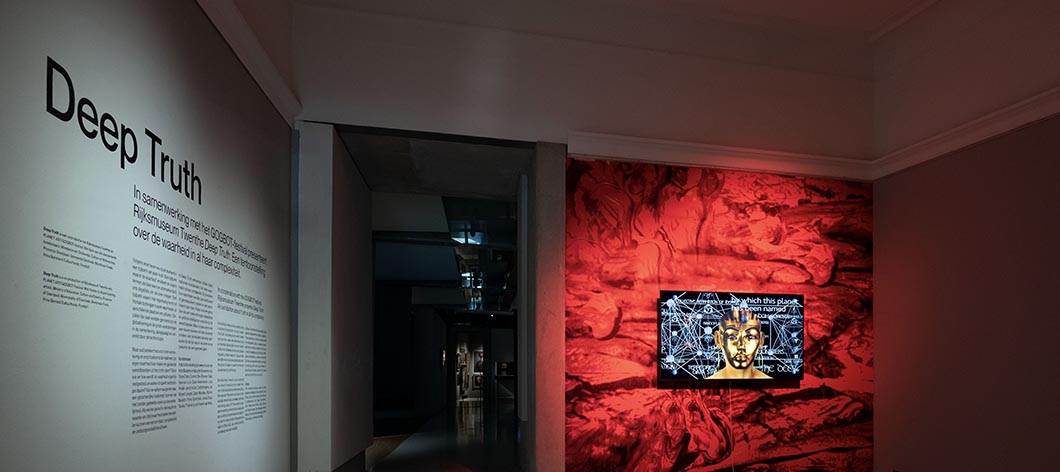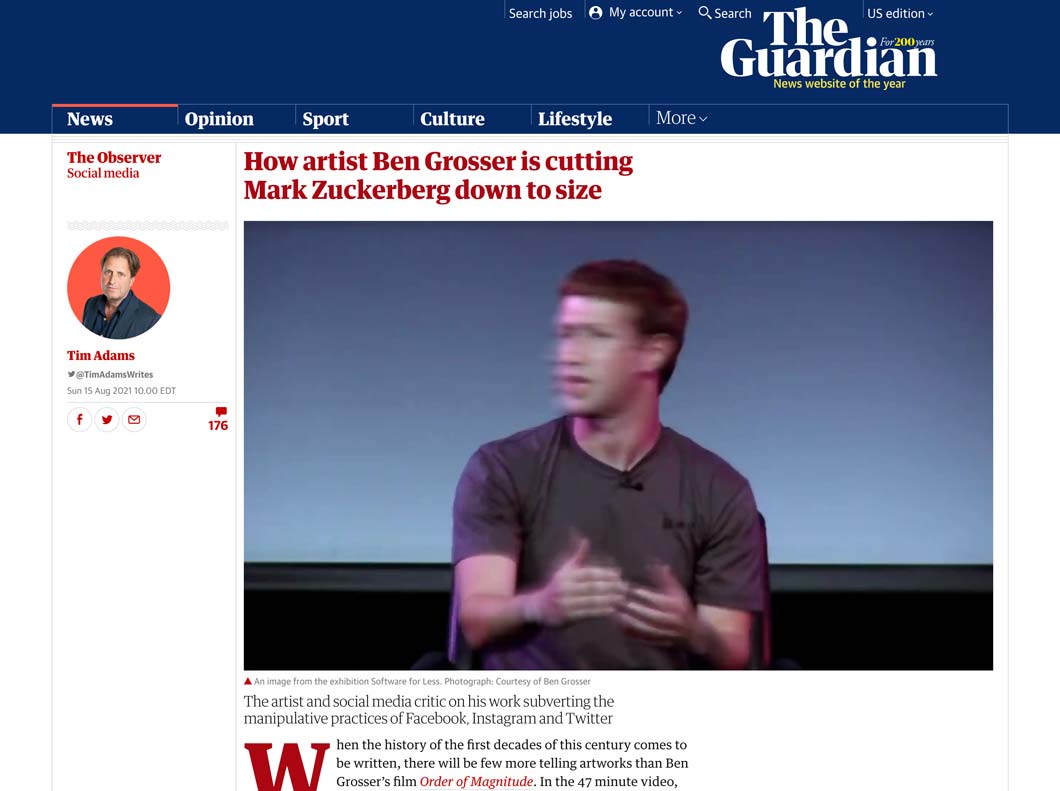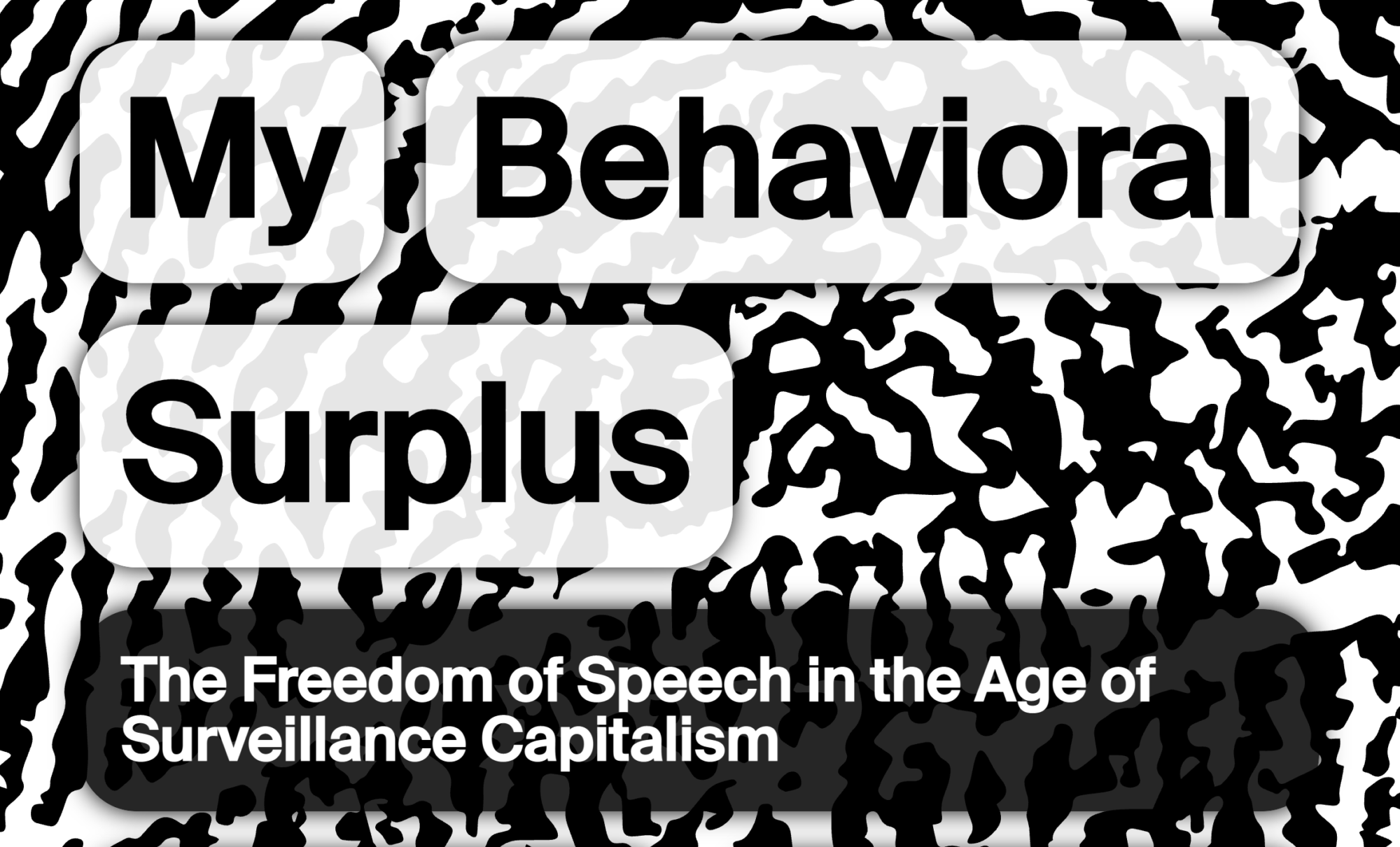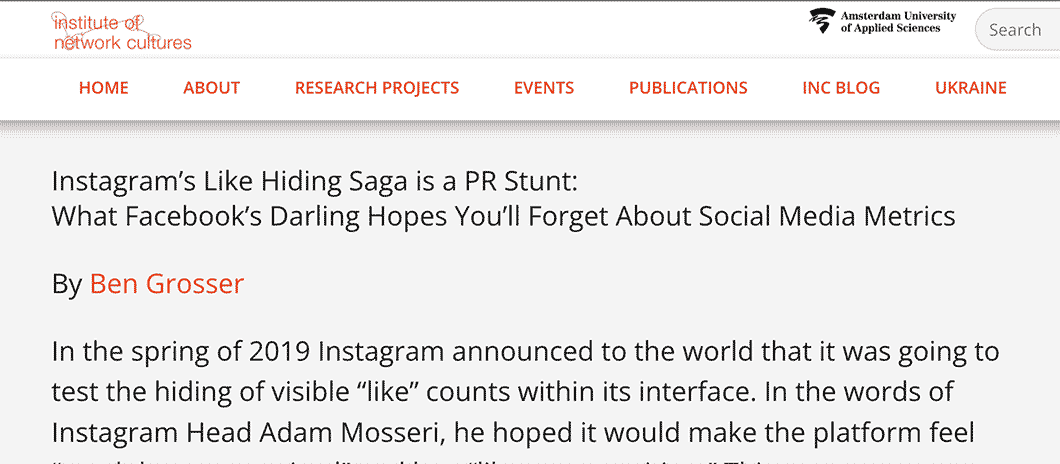I had a great conversation with Karine Galland about my social network Minus. Karine is an early user of the platform and a digital well being coach in Paris. She also wrote an article about her experience of Minus.
Blog
Interview with RTÉ (Ireland Public Radio)
I spoke with Luke Clancy of RTÉ (Ireland Public Radio) about making computer music in the 20th century, (resisting) Silicon Valley, my new social network Minus, NFTs and Tokenize This, and other topics that intersect with my arebyte show. The segment also features some of my own computer music and trumpet playing.
The interview aired over 3 nights (Part I, II, III), but the easiest way to listen is on this weekly edition that compiles them all into one:
Deep Truth at Rijksmuseum Twenthe Netherlands
My works Textbook, Safebook, and Not For You are part of Deep Truth at Rijksmuseum Twenthe in Enschede, Netherlands. Curated by Marie Janin and Kees De Groot, “[the] fifteen (inter)national artists [in Deep Truth] explore the idea of truth in all its complexity. They unravel how truths are constructed or manipulated, play a sophisticated game with them or show us a glimpse of a future in which deep fakes and artificial intelligence determine our view of the world. But they also speculate about new ways of looking at the world, about frames of mind that are better suited to the times we live in and the future we face.” Artists include Marjolijn Boterenbrood, Oana Clitan, Current, Ben Grosser, Seán Hannan, Joey Holder, Jenny Holzer, Carlijn Kingma, Jan Robert Leegte, Daito Manabe, Warren Neidich, Floris Schönfeld, Jonas Staal, Tamiko Thiel and /P, and Frederik de Wilde.
Deep Truth opens 9 Sep 2021 and closes in January 2022.
Interview with Ocula Magazine
I spoke with Sam Gaskin at Ocula about my new social network Minus, hiding metrics on Instagram, obfuscating social media with Not For You and Go Rando, and NFTs / Tokenize This.
Read the piece, titled Ben Grosser Wants to Mess with Your Socials.
Solo Exhibition Reviewed in The Guardian
My solo exhibition, Software for Less at arebyte Gallery in London, was reviewed in The Guardian / Observer. The article, titled How artist Ben Grosser is cutting Mark Zuckerberg down to size, walks through a number of my works, talking about ORDER OF MAGNITUDE, Facebook and Twitter Demetricator, Go Rando, and ScareMail, as well as new commissioned works premiered at arebyte such as DEFICIT OF LESS and Minus.
It’s a great text with a number of rather stunning quotes from author Tim Adams:
“When the history of the first decades of this century comes to be written, there will be few more telling artworks than Ben Grosser’s film Order of Magnitude … a mesmerising monologue, the story of our times.”
“The Zuckerberg films are exhibit A in a series of projects that have made Grosser perhaps the most usefully hands-on of all critics of social media.”
“[Grosser is] a one-man corrective to the data-driven world in which we all now find ourselves; his art highlights its limitations.“
Read the full piece.
Software for Less — Solo Exhibition at arebyte Gallery in London
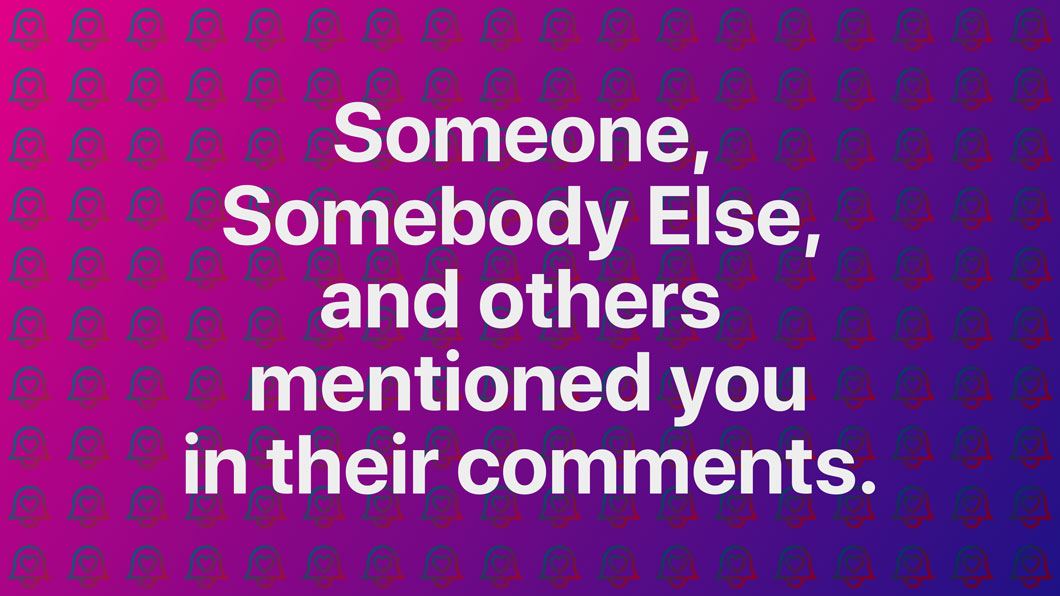
Still image from Platform Sweet Talk, 2021 — commissioned by arebyte
My solo exhibition, Software for Less, opens at arebyte Gallery in London on the 20th of August, and runs through 23 October. It will include several new commissioned works and a number of recent and/or ongoing projects (including one that will be rewritten as part of the show’s event series). Expertly curated by Rebecca Edwards.
Software for Less
arebyte Gallery, London
20 August – 23 OctoberThe last twenty years have been characterized by the rise of software. Software has enabled the web, animated the smartphone, and made possible, in the words of one big tech CEO, a world “more open and connected.” Yet software, which is now used by billions across the planet every day, has embedded within it the capitalist ideologies of those who make it. Coming out of growth-obsessed entrepreneurial culture from Silicon Valley in the United States, today’s software wants what its creators want: more. This want is fundamental, driving how software works, what it does, and what it makes (im)possible. The result is a global populace now dependent on software platforms that intentionally activate within users a “desire for more,” a need software meets with its “like” counts and algorithmic feeds and endless notifications, all in service of what big tech most seeks to realize their hopes and dreams: more users, more data, and more profit. And though wealth and fame has come to those who craft the platforms, their relentless focus on growth and scale has left a trail of destruction across society. Mental health, privacy, and democracy are all diminished, while authoritarianism, racism, and disinformationism are emboldened. Twenty years after the rise of software, big tech’s drive for more has transformed its most lauded asset into its biggest liability.
After years of artistic efforts to define, examine, reveal, and defuse how software activates the desire for more—to “demetricate” social media, to defuse emotional surveillance, to confuse big data algorithms, and to track and trace how the politics of interface become the politics of humanity—this exhibition presents the first outcomes from a new experiment, one that aims to generate a Software for Less. How would users feel if software platforms actively worked to reduce engagement rather than to produce it? What if software interfaces encouraged conceptions of time that are slow rather than fast? Why can’t software want less instead of more? Utilizing custom methods such as software recomposition, techniques like data obfuscation, and genres that include video supercuts and net art, Software for Less introduces functional applications and media-based artworks that tackle those questions, presenting works that produce less profit, less data, and less users. It includes a social network that aims to limit compulsions to use it, systems that make AI-driven feeds less attractive to those they profile, and the artifacts from investigations that reveal how a tiny few manipulates a broad public into a hyper state of more—and how disrupting that manipulation could point the way towards an alternative future. Not software for more, but Software For Less.
—Ben Grosser, 20 July 2021
Check back for new details, including links to the works online as well as info about a series of online and offline events throughout the exhibition.
Upcoming Keynote at the My Behavioral Surplus Festival in Stuttgart
I’ll be giving a keynote at the My Behavioral Surplus Festival in Stuttgart. The title of my talk is Less Metrics, More Rando: Techniques of Resistance in a Platform World. The session, titled How to Stay With the Trouble (referencing Haraway) includes a talk from Shusha Niederberger and a discussion with us and other festival artists moderated by Kay Zhang.
Online attendance is free, registration required. The session starts at 18:30 CEST / 11:30am CDT.
Comments and Tokenize This in Apollo Magazine
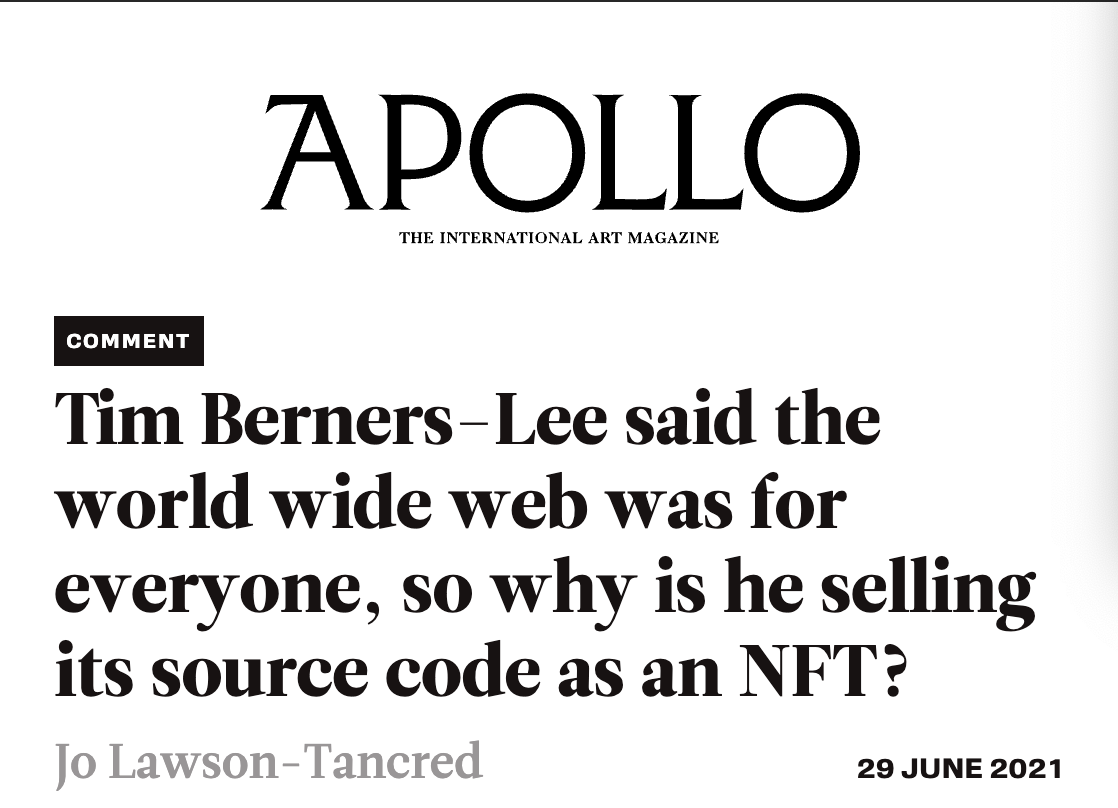
Apollo Magazine, June 29, 2021
I spoke with Apollo Magazine (UK) about the upcoming Tim Berners-Lee NFT auction of the WWW’s original source code, my NFT-resistant work Tokenize This, and my upcoming solo show at arebyte.
A few quotes:
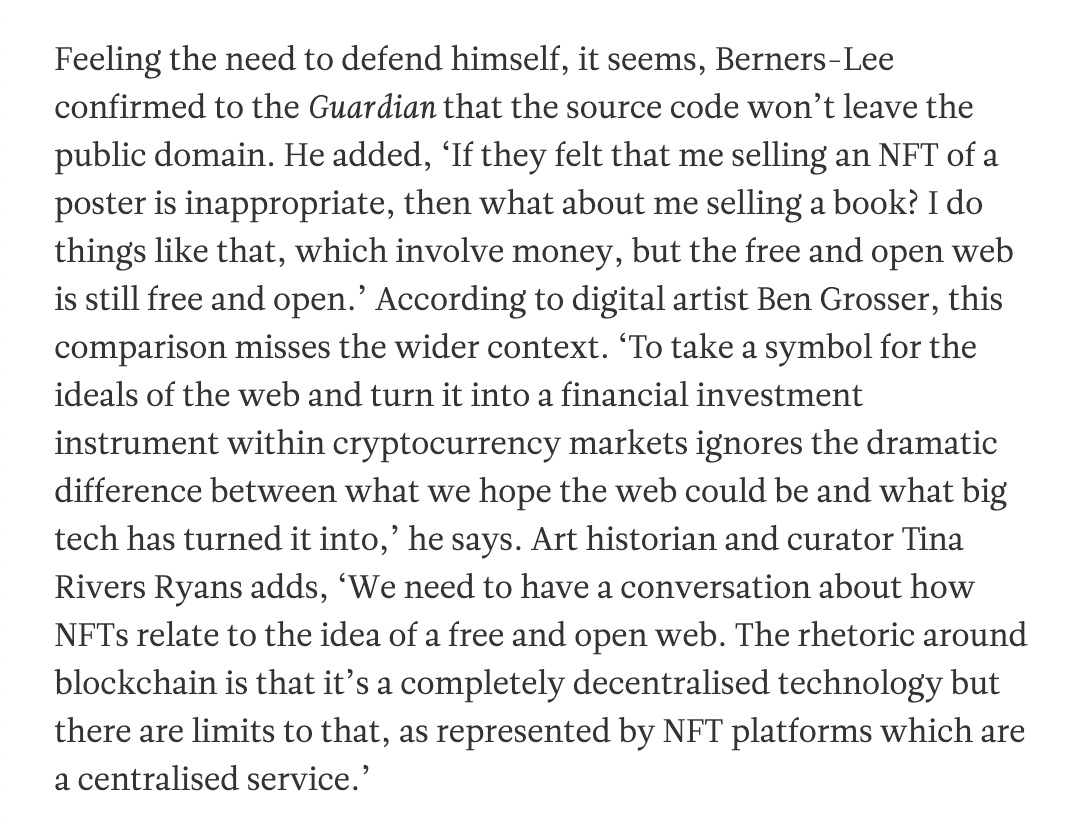
Speaking about Tim Berners-Lee in Apollo Magazine
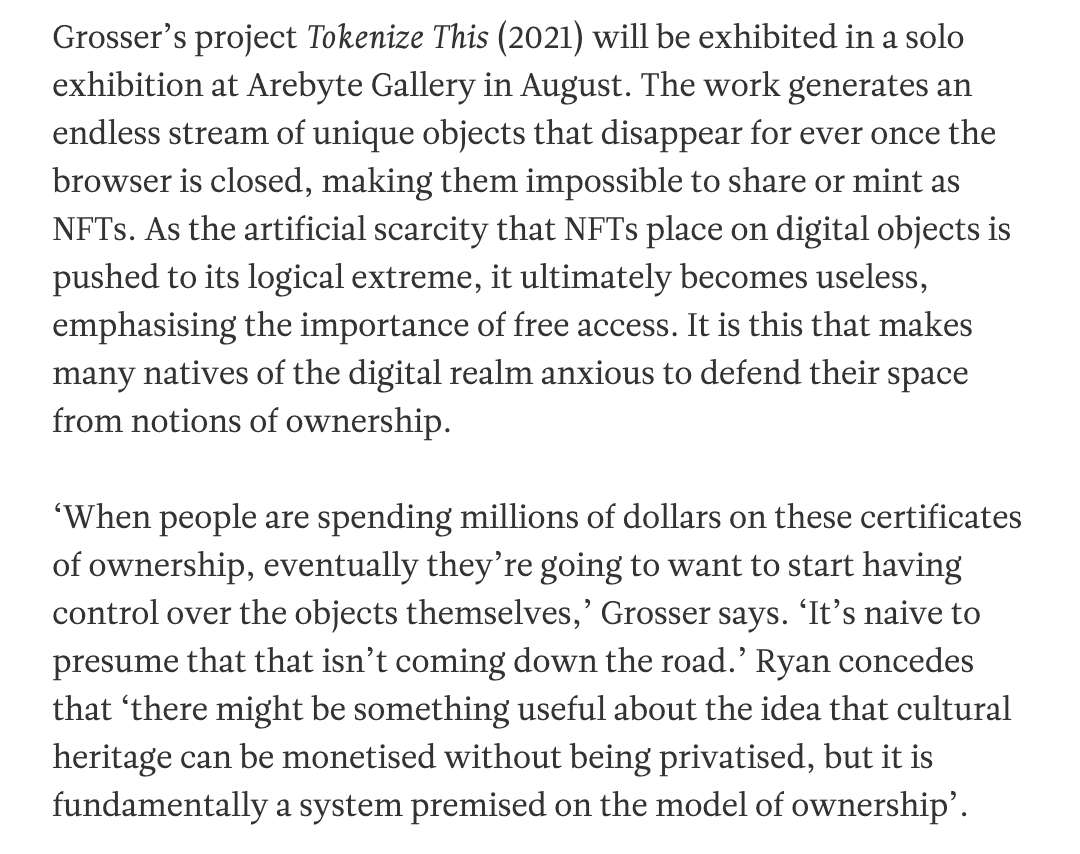
Speaking about Tokenize This, NFTs, and my upcoming show in Apollo Magazine
Thoughts on Platform Realism, Platform Exodus, and (Non)Platform Values
I wrote up a few thoughts about platforms and published them over at the Institute of Network Cultures’ Blog. These thoughts emerged from conversations with Geert Lovink, discussion on the empyre mailing list, and, as is often the case, conversation with Kate McDowell.
Article at Institute of Network Cultures about Instagram’s Like Hiding PR Stunt
I wrote up a few thoughts about Instagram’s two year like hiding saga, published on the Institute of Network Culture’s Blog.
“…Despite [the media’s] stories from the time heralding Instagram’s [like hiding] tests as evidence of the company’s newfound concern for user well-being, it was always inevitably going to lead to either no actual change, or, at best, an anemic one. This is because Instagram is a corporation whose profit depends on continued growth, fueled by the extraction of user data and the production of ever-rising platform engagement. Visible metrics have been, for its entire history, a key component of this production—I would argue they are the central mechanism responsible for Instagram’s success. …”
